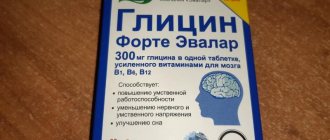Release form and composition
The dosage form of Neo-Bronchol is lozenges (without sugar): round, light brown, convex on one side, concave on the other, have a rough surface and a light mint aroma; Uneven coloring, slight unevenness of the edges, air bubbles in the tablet mass are acceptable (there are 2-4 blisters of 10 tablets in a cardboard pack).
Composition of 1 tablet:
- active substance: ambroxol hydrochloride – 15 mg;
- auxiliary components: acacia, 70% sorbitol solution, peppermint leaf oil, eucalyptus leaf oil, sodium saccharinate dihydrate, liquid paraffin, purified water.
Neo Bronchol
Release form
Sugar-free lozenges are light brown in color, round, convex on one side and concave on the other, with a rough surface, with a slight mint aroma; Uneven coloring, the presence of air bubbles in the tablet mass, and slight unevenness of the edges are allowed.
Compound
Active ingredient : ambroxol hydrochloride (15 mg).
Excipients: acacia, sorbitol solution 70%, peppermint leaf oil, eucalyptus oil (eucalyptus leaves), sodium saccharinate dihydrate, liquid paraffin, purified water.
Pharmacological group
Secretolytics and stimulants of motor function of the respiratory tract.
Action
Mucolytic agent with expectorant action. Ambroxol increases the secretion of the glands of the respiratory tract, stimulates the activity of the villi of the respiratory tract, and enhances the formation of surfactant in the lungs. Ambroxol is a metabolite of bromhexine.
Ambroxol: description of the substance
Indications
Diseases of the respiratory tract accompanied by the release of viscous and difficult-to-discharge secretions:
- acute and chronic bronchitis;
- pneumonia;
- bronchial asthma with difficulty in sputum discharge;
- bronchiectasis;
- COPD
Contraindications and restrictions
- Hypersensitivity to ambroxol or auxiliary components of the drug;
- I trimester of pregnancy;
- lactation period (breastfeeding);
- children under 6 years of age.
Carefully
- liver failure;
- renal dysfunction;
- peptic ulcer of the stomach and duodenum;
- II and III trimesters of pregnancy;
- lactation period.
Application and dosage
For oral use: after meals, dissolve until completely dissolved.
- Children from 6 to 12 years old: one tablet (15 mg) 2-3 times a day. Do not take more than 3 tablets within 24 hours.
- Adults and children over 12 years of age : two tablets (30 mg) 3 times a day for the first 2-3 days. Do not take more than 6 tablets in 24 hours. Next, it is recommended to take 1 tablet 3 times a day.
To achieve a greater mucolytic effect during therapy, it is necessary to consume a sufficient amount of fluid. Do not take the drug for more than 4-5 days unless directed by a doctor.
special instructions
Instructions for diabetic patients: 1 sugar-free lozenge contains a 70% sorbitol solution (not crystallized), 922.2 mg (dry matter), which corresponds to 0.08 XE (bread units).
Storage
The drug should be stored at a temperature not exceeding +25 ° C, in a place protected from light. The shelf life of the tablets is 4 years.
Production
- Divapharma GmbH (Germany);
- Bolder Artsneimittel GmbH and Co.KG (Germany).
Package
10 pieces. in a blister. 2, 3 or 4 blisters in a cardboard box.
Recipe
Available without a prescription.
Pharmacological properties
Pharmacodynamics
Neo-Bronchol is one of the mucolytic agents that stimulate prenatal lung development (increases the synthesis and secretion of surfactant and blocks its breakdown). It has a secretomotor, secretolytic and expectorant effect.
Main properties of ambroxol:
- stimulation of serous cells of the glands of the bronchial mucosa;
- an increase in the content of mucous secretion and the release of a surfactant (surfactant) in the bronchi and alveoli;
- normalization of the disturbed ratio of mucous and serous components of sputum;
- a decrease in sputum viscosity, which occurs due to the activation of hydrolyzing enzymes and increased release of lysosomes from Clara cells;
- increased motor activity of the ciliated epithelium, increased mucociliary transport.
The effect of Neo-Bronchol develops 30 minutes after ingestion. Its duration is from 6 to 12 hours.
Pharmacokinetics
Ambroxol has high absorption, the maximum concentration in the blood is achieved in 2 hours, the connection with plasma proteins is 85%.
Penetrates through the blood-brain and placental barriers and is excreted in breast milk.
The metabolic process occurs in the liver with the formation of dibromanthranilic acid and glucuronic conjugates. T1/2 (half-life) varies from 7 to 12 hours.
Excreted by the kidneys: 10% unchanged, 90% as water-soluble metabolites.
In severe chronic renal failure, T1/2 increases by 20–40%.
Pharmacological properties of the drug Neo-bronchol
Pharmacodynamics. Ambroxol is an active N-desmethyl metabolite of bromhexine. Although its mechanism of action is not generally established, many studies have confirmed its secretolytic and secretomotor effects. In animal studies, ambroxol normalized the disturbed ratio of serous and mucous components of sputum. A decrease in the viscosity of bronchial secretions and activation of the ciliary epithelium contribute to increased mucus excretion. The drug increases the motor activity of the ciliated epithelium and increases mucociliary transport. There is evidence of an increase in the content of mucous secretions and the synthesis of a surfactant (surfactant) in the alveoli and bronchi, as well as evidence of an increase in the permeability of the vessels of the bronchial tree. The effect of the drug after oral administration appears after 30 minutes, the effect lasts for 6–12 hours depending on the dose. Pharmacokinetics. After oral administration, ambroxol is rapidly and almost completely absorbed. The maximum concentration after oral administration is 1–3 hours. Due to first-pass metabolism through the liver, the absolute bioavailability of ambroxol after oral administration is reduced by approximately 1/3. As a result of this process, metabolites are formed that are excreted by the kidneys (namely dibromoanthranilic acid and glucuronide). About 85% (80–90%) is bound to plasma proteins. The half-life from blood plasma is 7–12 hours. The half-life of ambroxol and its metabolites is 22 hours. More than 90% of ambroxol is excreted by the kidneys in the form of metabolites formed in the liver. Less than 10% of unchanged ambroxol can be detected in urine excretion. Due to the high degree of binding to plasma proteins, large volume of distribution and slow redistribution from tissue to blood, ambroxol is not significantly eliminated by renal dialysis or increased diuresis. In cases of serious liver disease, the clearance of ambroxol is reduced by 20–40%. With significant impairment of renal function, the half-life of ambroxol metabolites is prolonged. Ambroxol penetrates into the CSF and placenta, and is also excreted into breast milk.
Contraindications
Absolute:
- I trimester of pregnancy;
- age up to 6 years;
- individual intolerance to the components of the drug.
Relative (Neo-Bronchol is prescribed under medical supervision):
- peptic ulcer of the stomach and duodenum;
- renal dysfunction;
- liver failure;
- bronchial diseases associated with excessive sputum production;
- II–III trimesters of pregnancy and lactation.
Neo-bronchol 15 mg 20 pcs. sugar-free lozenges
pharmachologic effect
A mucolytic agent that stimulates the prenatal development of the lungs (increases the synthesis and secretion of surfactant and blocks its breakdown). Has secretomotor, secretolytic and expectorant effects; stimulates the serous cells of the glands of the bronchial mucosa, increases the content of mucous secretion and the release of surfactant in the alveoli and bronchi; normalizes the disturbed ratio of serous and mucous components of sputum. By activating hydrolyzing enzymes and enhancing the release of lysosomes from Clara cells, it reduces the viscosity of sputum. Increases the motor activity of the ciliated epithelium, increases mucociliary transport. After oral administration, the effect occurs within 30 minutes. and lasts for 6-12 hours.
Composition and release form Neo-bronchol 15 mg 20 pcs. sugar-free lozenges
Tablet - 1 tablet:
- Active substance: 15 mg ambroxol hydrochloride;
- Excipients: acacia, sorbitol solution 70%, peppermint leaf oil, eucalyptus leaf oil, sodium saccharinate dihydrate, liquid paraffin, purified water.
Pills.
Description of the dosage form
Round, convex on one side and concave on the other side, tablets with a rough surface are light brown in color with a slight mint aroma.
Directions for use and doses
Children from 6 to 12 years: dissolve one tablet (15 mg) 2-3 times a day. Do not take more than 3 lozenges within 24 hours (equivalent to 45 mg ambroxol hydrochloride).
Adults and children over 12 years of age: dissolve two tablets (30 mg) 3 times daily for the first 2-3 days. Do not take more than 6 tablets in 24 hours. Next, it is recommended to take 1 tablet 3 times a day.
Pharmacokinetics
Absorption is high (for any route of administration), the time to reach maximum concentration in the blood is 2 hours, the connection with plasma proteins is 85%. Penetrates the blood-brain barrier, placental barrier, and is excreted in breast milk. Metabolism - in the liver, forms dibromoanthranilic acid and glucuronic conjugates. Half-life T1/2 - 7 - 12 hours. Excreted by the kidneys: 90% in the form of water-soluble metabolites, unchanged - 10%. T1/2 increases by 20 - 40% in severe chronic renal failure (CRF), does not change with impaired liver function.
Indications for use Neo-bronchol 15 mg 20 pcs. sugar-free lozenges
Diseases of the respiratory tract, accompanied by the release of viscous and difficult to separate secretions: acute and chronic bronchitis, pneumonia, COPD (chronic obstructive pulmonary disease), bronchial asthma with difficulty in sputum discharge, bronchiectasis.
Contraindications
Hypersensitivity.
Application Neo-bronchol 15 mg 20 pcs. lozenges without sugar during pregnancy and breastfeeding
Do not take during pregnancy in the 1st trimester.
Do not take to children under 6 years of age.
special instructions
Instructions for diabetic patients: 1 sugar-free lozenge neo-bronchol contains a 70% sorbitol solution (not crystallized), 922.2 mg (dry matter), which corresponds to 0.08 XE (bread units).
Overdose
Nausea, vomiting, diarrhea, dyspepsia.
Side effects Neo-bronchol 15 mg 20 pcs. sugar-free lozenges
From the gastrointestinal tract: rarely - nausea, diarrhea, constipation, gastralgia, vomiting.
Allergic reactions: skin rash, itching, urticaria, contact dermatitis, in isolated cases - anaphylactic shock, angioedema, exanthema.
From the respiratory system: dryness in the respiratory tract.
From the urinary system: dysuria.
Drug interactions
Combined use with antitussive drugs leads to difficulty in sputum discharge while reducing cough. Increases the penetration of antibiotics amoxicillin, cefuroxime, erythromycin, and doxycycline into the bronchial secretions.
Instructions for use of Neo-Bronchol: method and dosage
Neo-Bronchol lozenges should be taken after meals, dissolving in the mouth until completely dissolved.
Recommended dosage regimen:
- children 6–12 years old: 2–3 times a day, 1 tablet, maximum 3 tablets per day;
- children over 12 years of age and adults: 3 times a day, 2 tablets for 2–3 days of therapy, maximum 6 tablets per day. In the future, it is recommended to take the drug 3 times a day, 1 tablet.
In order to achieve a greater mucolytic effect during the period of taking Neo-Bronchol, you need to consume a sufficient amount of liquid.
Unless otherwise prescribed by a doctor, therapy should not be carried out for longer than 4–5 days.
Overdose of the drug Neo-bronchol, symptoms and treatment
Symptoms of intoxication following an overdose of the drug were not noted. There have been reports of brief loss of consciousness and diarrhea. Neo-bronchol was well accepted by patients when administered parenterally at a dose of over 15 mg/kg/day and when administered orally at a dose of 25 mg/kg/day. According to preclinical studies, with a significant overdose, increased salivation, nausea, and hypotension may occur. Treatment: measures such as artificial induction of vomiting and gastric lavage are usually not prescribed and are used only in cases of significant overdose. Symptomatic treatment is recommended.


